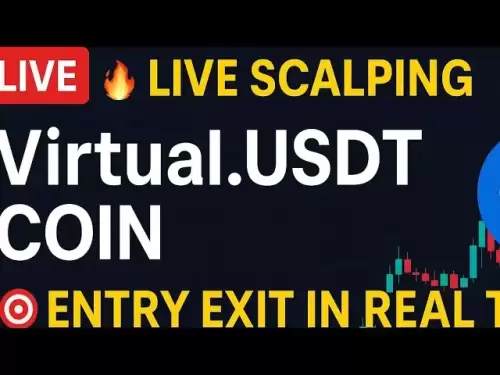-
 Bitcoin
Bitcoin $117,949.0176
0.77% -
 Ethereum
Ethereum $3,143.8503
5.85% -
 XRP
XRP $2.9255
2.03% -
 Tether USDt
Tether USDt $1.0000
-0.01% -
 BNB
BNB $689.0236
1.11% -
 Solana
Solana $163.3524
2.09% -
 USDC
USDC $0.9999
-0.01% -
 Dogecoin
Dogecoin $0.1984
3.58% -
 TRON
TRON $0.3009
0.32% -
 Cardano
Cardano $0.7433
2.52% -
 Hyperliquid
Hyperliquid $47.5538
-0.91% -
 Stellar
Stellar $0.4607
2.37% -
 Sui
Sui $4.0009
3.44% -
 Chainlink
Chainlink $16.0734
4.54% -
 Hedera
Hedera $0.2338
-0.44% -
 Bitcoin Cash
Bitcoin Cash $497.6300
1.10% -
 Avalanche
Avalanche $21.9301
5.61% -
 UNUS SED LEO
UNUS SED LEO $8.8476
-1.77% -
 Shiba Inu
Shiba Inu $0.0...01363
5.22% -
 Toncoin
Toncoin $3.0956
3.08% -
 Litecoin
Litecoin $95.9863
3.76% -
 Polkadot
Polkadot $4.0746
5.35% -
 Monero
Monero $335.3704
-1.17% -
 Uniswap
Uniswap $9.2284
3.49% -
 Dai
Dai $1.0002
0.02% -
 Bitget Token
Bitget Token $4.5845
5.04% -
 Pepe
Pepe $0.0...01270
5.96% -
 Ethena USDe
Ethena USDe $1.0005
-0.01% -
 Aave
Aave $329.3693
5.71% -
 Bittensor
Bittensor $438.6437
4.80%
Are crypto futures regulated in the US?
In the U.S., crypto futures are regulated by the CFTC as commodity derivatives, with approved platforms like CME and Bakkt offering compliant trading options.
Jul 12, 2025 at 12:49 pm

Regulatory Framework for Crypto Futures in the United States
The question of whether crypto futures are regulated in the US involves a complex interplay between various regulatory agencies and evolving financial laws. The primary authority overseeing futures markets in the United States is the Commodity Futures Trading Commission (CFTC). Since 2015, the CFTC has classified cryptocurrencies like Bitcoin and Ethereum as commodities, placing them under its jurisdiction.
This classification enables the CFTC to regulate derivatives based on cryptocurrencies, including futures contracts. Consequently, any platform offering crypto futures must comply with CFTC regulations or operate under an exemption. However, this does not mean that all crypto futures trading in the US is fully legal or uniformly regulated across all platforms.
Legal Platforms Offering Regulated Crypto Futures
Several major exchanges in the US offer regulated crypto futures products, including CME Group (Chicago Mercantile Exchange) and Bakkt. These platforms have worked closely with the CFTC and other regulatory bodies to ensure compliance with existing financial regulations.
- CME launched Bitcoin futures in December 2017 and later added Ethereum futures.
- Bakkt, backed by Intercontinental Exchange (ICE), also offers physically-settled Bitcoin futures contracts.
These exchanges operate under strict oversight, including requirements related to reporting, transparency, and risk management. Any individual or institution wishing to trade these futures must do so through these approved venues or brokers authorized by the CFTC.
Unregulated Offshore Platforms and Risks Involved
While some platforms offer regulated crypto futures, many others operate outside the jurisdiction of the CFTC, particularly offshore exchanges. These platforms often allow US residents to trade crypto futures without adhering to US regulatory standards.
Examples include certain international crypto exchanges that offer leveraged futures contracts with high margin ratios. Although access may be available via virtual private networks (VPNs) or other means, using such platforms exposes traders to significant risks:
- Lack of investor protections
- No oversight or dispute resolution mechanisms
- Potential fraud or manipulation
The CFTC has issued multiple warnings advising retail investors about the dangers of engaging with unregulated crypto futures platforms.
Interaction Between CFTC and SEC Jurisdiction
One of the complexities surrounding crypto futures regulation is the overlapping jurisdiction between the CFTC and the Securities and Exchange Commission (SEC). While the CFTC regulates commodities and their derivatives, the SEC oversees securities and their related instruments.
If a cryptocurrency is deemed a security by the SEC, it falls under its purview rather than the CFTC’s. This distinction affects how futures contracts involving such assets are regulated. For example, if a new digital asset is ruled a security, any futures contract tied to it would need to comply with SEC rules, which are generally more stringent.
This dual-regulatory framework can create confusion for market participants and delays in product approvals, especially when both agencies claim authority over specific assets or instruments.
Requirements for Domestic Crypto Exchanges Offering Futures
For a domestic exchange to legally offer crypto futures trading, it must meet several regulatory conditions:
- Obtain approval from the CFTC as a Designated Contract Market (DCM) or operate under an exempt category.
- Comply with position limits and reporting obligations.
- Implement robust risk management systems to prevent manipulation and excessive speculation.
- Ensure customer funds are segregated and protected.
Exchanges seeking to list crypto futures must also submit detailed proposals outlining their product design, surveillance measures, and compliance protocols. The CFTC evaluates each proposal individually before granting approval.
Recent Enforcement Actions by the CFTC
The CFTC has taken numerous enforcement actions against entities violating US commodity laws, including those related to crypto futures trading. Notable cases include:
- Bitfinex and iFinex: Fined $1.5 million for offering illegal off-exchange retail commodity transactions.
- Bybit: Received a cease-and-desist letter from the CFTC for allowing US customers to trade unregistered futures contracts.
- KuCoin: Sued by the CFTC for operating an unregistered trading platform and enabling unlawful leverage to US users.
These actions demonstrate the CFTC’s commitment to enforcing regulations around crypto futures, particularly where retail investors are involved.
Frequently Asked Questions
Q: Can I trade crypto futures on Binance in the US?
A: No, Binance no longer allows US users to trade futures due to regulatory restrictions. However, Binance.US, the separately operated US-based version, does not currently offer futures trading.
Q: Are there age restrictions for trading regulated crypto futures in the US?
A: Yes, most regulated platforms require traders to be at least 18 years old and provide valid identification to open an account.
Q: Do I need to pay taxes on profits from crypto futures trading?
A: Yes, profits from crypto futures trading are subject to capital gains tax. Traders must report all taxable events to the IRS and maintain accurate records.
Q: Is margin trading allowed on regulated crypto futures platforms?
A: Yes, regulated platforms like CME offer margin trading but within predefined limits and with appropriate risk disclosures required by regulators.
Disclaimer:info@kdj.com
The information provided is not trading advice. kdj.com does not assume any responsibility for any investments made based on the information provided in this article. Cryptocurrencies are highly volatile and it is highly recommended that you invest with caution after thorough research!
If you believe that the content used on this website infringes your copyright, please contact us immediately (info@kdj.com) and we will delete it promptly.
- Bitcoin's Bullish Run: Demand Surges, Correction Unlikely?
- 2025-07-16 12:30:12
- MetYa, Conflux Network, and SocialFi: Building the Future of Web3
- 2025-07-16 12:30:12
- Cantor Fitzgerald, Bitcoin, and SPAC Acquisitions: A New York Perspective
- 2025-07-16 10:30:12
- PoL v2 and BeraChain: Building a Stronger Blockchain Ecosystem
- 2025-07-16 10:30:12
- Bitcoin, Social Media, and FOMO: A New Yorker's Take on the Crypto Craze
- 2025-07-16 10:50:12
- GameStop, Bitcoin, and the Inflation Hedge: A New York Perspective
- 2025-07-16 08:30:12
Related knowledge

What is a stablecoin-margined contract vs a coin-margined contract?
Jul 15,2025 at 06:36pm
Understanding the Difference Between Stablecoin-Margined Contracts and Coin-Margined ContractsIn the world of cryptocurrency derivatives, margin plays...

How to backtest a Bitcoin futures trading strategy?
Jul 15,2025 at 11:35am
Understanding Bitcoin Futures TradingBitcoin futures trading involves contracts to buy or sell Bitcoin at a predetermined price and date in the future...

Psychology of trading Bitcoin contracts
Jul 13,2025 at 02:50am
Understanding the Emotional Rollercoaster of Bitcoin Futures TradingBitcoin contract trading, especially in the form of futures, introduces a high lev...

Can the Lightning Network be used for smart contracts?
Jul 14,2025 at 11:28pm
Understanding the Lightning Network's Core FunctionalityThe Lightning Network is a second-layer solution built on top of blockchain protocols like Bit...

How does macroeconomic news affect Bitcoin futures prices?
Jul 15,2025 at 04:56pm
Understanding the Relationship Between Macroeconomic News and Bitcoin FuturesBitcoin futures are derivative contracts that allow traders to speculate ...

Best time of day to trade Bitcoin contracts?
Jul 13,2025 at 05:29am
Understanding Bitcoin Contracts and Their VolatilityBitcoin contracts, particularly futures contracts, are derivative instruments that allow traders t...

What is a stablecoin-margined contract vs a coin-margined contract?
Jul 15,2025 at 06:36pm
Understanding the Difference Between Stablecoin-Margined Contracts and Coin-Margined ContractsIn the world of cryptocurrency derivatives, margin plays...

How to backtest a Bitcoin futures trading strategy?
Jul 15,2025 at 11:35am
Understanding Bitcoin Futures TradingBitcoin futures trading involves contracts to buy or sell Bitcoin at a predetermined price and date in the future...

Psychology of trading Bitcoin contracts
Jul 13,2025 at 02:50am
Understanding the Emotional Rollercoaster of Bitcoin Futures TradingBitcoin contract trading, especially in the form of futures, introduces a high lev...

Can the Lightning Network be used for smart contracts?
Jul 14,2025 at 11:28pm
Understanding the Lightning Network's Core FunctionalityThe Lightning Network is a second-layer solution built on top of blockchain protocols like Bit...

How does macroeconomic news affect Bitcoin futures prices?
Jul 15,2025 at 04:56pm
Understanding the Relationship Between Macroeconomic News and Bitcoin FuturesBitcoin futures are derivative contracts that allow traders to speculate ...

Best time of day to trade Bitcoin contracts?
Jul 13,2025 at 05:29am
Understanding Bitcoin Contracts and Their VolatilityBitcoin contracts, particularly futures contracts, are derivative instruments that allow traders t...
See all articles

























































































